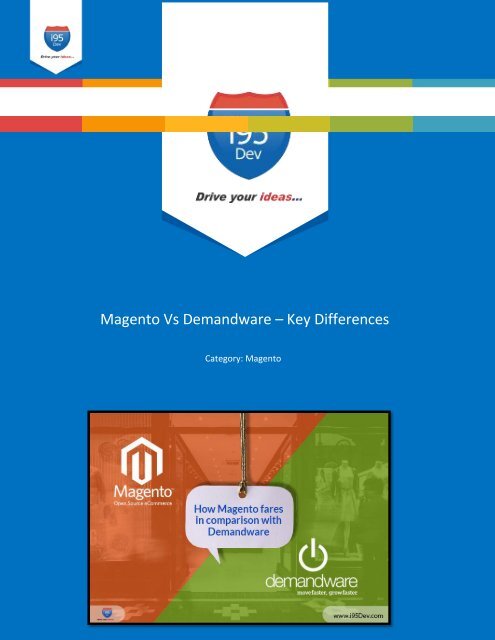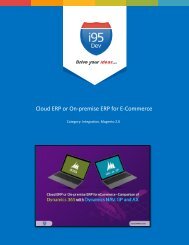Magento vs Demandware
i95dev has discussed the 5 key differences between Demandware and magento eCommerce. Learn which platform satisfies your specific business needs.
i95dev has discussed the 5 key differences between Demandware and magento eCommerce. Learn which platform satisfies your specific business needs.
Create successful ePaper yourself
Turn your PDF publications into a flip-book with our unique Google optimized e-Paper software.
<strong>Magento</strong> Vs <strong>Demandware</strong> – Key Differences<br />
Category: <strong>Magento</strong><br />
www.i95Dev.com | USA | Australia | India | Copyright © 2019. i95Dev. All Rights Reserved. 2
A perfectly scalable e-commerce platform lies at the heart of any e-commerce business or operation.<br />
In the past, shopping was everything related to a brick and mortar store or a fancy retail outlet, which<br />
covered the local neighborhood. However, today’s picture is far from it. In the current era of the<br />
internet-fueled e-commerce boom, a web store becomes the storefront, which hosts its products and<br />
services. Hence, a website can be the differentiator between an iconic brand and one that gradually<br />
fades into the oblivion. However, with the number of options available in the market, today choosing<br />
the correct e-commerce platform is no mean fete.<br />
To start with, many factors come to play. While choosing an e-commerce platform, below are a few<br />
factors to consider.<br />
<br />
<br />
<br />
<br />
Is the e-commerce platform hosted or self-hosted<br />
Ability to provide robust support and back up network<br />
Ability to integrate with various back end systems<br />
Pricing and maintenance cost<br />
Upon considering these points, no seasoned analyst with a penchant for e-commerce can fail to<br />
compare the two most robust and scalable e-commerce platforms operating in the domain, <strong>Magento</strong><br />
and <strong>Demandware</strong>.<br />
<strong>Magento</strong> <strong>vs</strong> <strong>Demandware</strong><br />
In this article, we will dwell deeper into the features of two top of the line e-commerce platforms,<br />
which are both contemporaries and leaders, related to certain features.<br />
Some of the largest e-commerce stores are powered by the platforms <strong>Demandware</strong> and <strong>Magento</strong>.<br />
This article outlines the features of both the platform through the prism of the broad categories which<br />
is important while identifying an e-commerce platform.<br />
Hosting and Maintenance<br />
<strong>Demandware</strong>: This e-commerce platform offers a fully hosted multi-tenant proprietary solution, which<br />
means all the infrastructure is managed by <strong>Demandware</strong>. This is an attractive option for e-commerce<br />
companies, who do not want to get into the hassles of security and maintenance of the site and solely<br />
concentrate on selling their products and services.<br />
But the real problem arises when a business wants to install a customized add on module for their<br />
eStore. These exclusive customizations require approval from <strong>Demandware</strong> and their restrictions are<br />
said to be in place to ensure the site still functions after the customization.<br />
www.i95Dev.com | USA | Australia | India | Copyright © 2019. i95Dev. All Rights Reserved. 2
However, this makes rolling out of quick and customized solutions to scale up e-commerce operations<br />
near to impossible with <strong>Demandware</strong>.<br />
<strong>Magento</strong>: E-commerce businesses must have come across enough criticism related to <strong>Magento</strong> of<br />
being too technical and complicated to manage. However, <strong>Magento</strong> on the other side, it is a selfhosted<br />
solution and gives complete control to the store owner over the infrastructure.<br />
There are many expert <strong>Magento</strong> agencies which maintain strong relations with hosting partners and<br />
act as intermediaries to handle any upgrade and infrastructural changes. There is even scope for<br />
adding customized modules to scale up a business without the need to take any approvals, in short<br />
<strong>Magento</strong> lets the e-commerce business own their store infrastructure. Hosting is a topic in itself.<br />
Scope for Integration<br />
<strong>Demandware</strong>: All the features required for flawless functioning of an e-commerce store is taken care<br />
in the platform <strong>Demandware</strong>. It unifies order management, POS and other offline store operations<br />
into one solution.<br />
There are even built-in tools that enable in-store representatives to engage with customers on the<br />
shop floor using mobile devices, which eases assisting customers by offering personalized product<br />
suggestions.<br />
<strong>Magento</strong>: This platform is an open-source platform that increases the elbow space for businesses to<br />
maneuver around and scale their operations with customized integration modules. It is a clear<br />
advantage over <strong>Demandware</strong>.<br />
There is an ever-increasing community of <strong>Magento</strong> evangelists, developers and agencies available<br />
worldwide that helps in upkeep and maintenance of <strong>Magento</strong> platform. This is the appeal and clear<br />
advantage that <strong>Magento</strong> holds up its sleeve because of the existing integration available for thirdparty<br />
service of choice with a huge array of modules pre-built and available through the <strong>Magento</strong><br />
marketplace. Read our eBook on ERP <strong>Magento</strong> integration touchpoints to get a feel of the flexibility<br />
offered by <strong>Magento</strong>.<br />
Support and flexibility<br />
<strong>Demandware</strong>: There is a robust support system in place for <strong>Demandware</strong> platform with a 24/7 support<br />
available which is not confined to only support for core issues. Apart from the support system in place,<br />
the other issues that the <strong>Demandware</strong> platform addresses for its users are:<br />
<br />
<br />
<br />
<br />
Flexibility around the SEO<br />
Giving users control over redirects<br />
Powerful cross-selling and up-selling options<br />
Customer-facing email management<br />
www.i95Dev.com | USA | Australia | India | Copyright © 2019. i95Dev. All Rights Reserved. 2
The support and flexibility offered by <strong>Demandware</strong> look great for any e-commerce business. However,<br />
it comes with a heavy price tag, which is a huge drawback for small and medium-sized e-commerce<br />
operations looking for a scalable e-commerce platform option.<br />
<strong>Magento</strong>: The platform of <strong>Magento</strong> is renowned for the eco-system of support services it has in place<br />
and the level of support it provides even deals with serious code issues which are very important for<br />
the smooth running of e-commerce operations.<br />
Apart from that, <strong>Magento</strong> even offers services such as:<br />
<br />
<br />
<br />
<br />
Purchase mails email management<br />
Options for the customer service representatives to input orders through backend which is a<br />
huge advantage to reducing the scope for manual errors if bi-directional sync between<br />
<strong>Magento</strong> and ERP is made<br />
Excellent built-in visual merchandising after <strong>Magento</strong> acquired Ontap Visual merchandizer<br />
extension<br />
Customized coupons<br />
The clear advantage <strong>Magento</strong> has over <strong>Demandware</strong> is the number of features available to e-<br />
commerce players without being too costly and taking a toll on their economies.<br />
Customizations<br />
<strong>Magento</strong>: Customization includes overall store interface including themes as well as the backend.<br />
<strong>Magento</strong> opens up the code to make any necessary changes to it. With the presence of a large agency<br />
network and a thriving community, it is very easy to make these visual changes.<br />
<strong>Demandware</strong>: While <strong>Demandware</strong> also provides flexibility to customize the platform, it is nowhere<br />
near to that of <strong>Magento</strong>. <strong>Demandware</strong> team must approve any changes made on the platform. The<br />
community and the agencies for <strong>Demandware</strong> are limited and hence, the resources are rarely making<br />
them costly.<br />
Community<br />
<strong>Magento</strong>: <strong>Magento</strong> enjoys the benefits of having a large community. The community edition of<br />
<strong>Magento</strong> has given eCommerce players the flexibility to make any necessary changes. Today, this<br />
community grew to more than a hundred thousand community members. The sheer amount of value<br />
you can derive from this community is overwhelming.<br />
<strong>Demandware</strong>: <strong>Demandware</strong>, on the other hand, has a limited number of registered agencies who can<br />
help you make changes to the platform. The resources with <strong>Demandware</strong> expertise are expensive ones<br />
and it is hard to find quality consultants, who can help you improve your platform.<br />
www.i95Dev.com | USA | Australia | India | Copyright © 2019. i95Dev. All Rights Reserved. 2
While you have most features needed for your business, aspects like developing specific feature<br />
because it is important for your business, is going to be difficult.<br />
B2B eCommerce<br />
<strong>Magento</strong>: <strong>Magento</strong> has picked up a lot of market learning from <strong>Magento</strong> 1 and brought it to <strong>Magento</strong><br />
2. Today, <strong>Magento</strong> 2 is a platform with rich B2B features. Most customers can readily access the B2B<br />
business features in <strong>Magento</strong> like<br />
<br />
<br />
<br />
<br />
<br />
Multiple buyers per account<br />
Request a quote<br />
Quick order entry and requisition list<br />
Payment to accounts<br />
Company credits & more<br />
Customers had to depend on third-party extensions in the past to enable these features.<br />
<strong>Demandware</strong>: While <strong>Demandware</strong> fares decently in B2C features, most features required for B2B are<br />
missing in <strong>Demandware</strong>. This is a critical shortfall in <strong>Demandware</strong>. This is the reason most B2B<br />
eCommerce companies do not opt for <strong>Demandware</strong>. While this gap can be filled using extensions, it<br />
makes the development process complicated.<br />
Agencies and Developers<br />
Pricing<br />
<strong>Demandware</strong>: There are not many agencies, who can work on <strong>Demandware</strong>, and even the number of<br />
developers who can work on <strong>Demandware</strong> software is particularly less. The number of websites on<br />
the <strong>Demandware</strong> platform is 49,994 and the agencies which work on <strong>Demandware</strong> charge exorbitant<br />
prices.<br />
<strong>Magento</strong>: This is the segment where <strong>Magento</strong> beats <strong>Demandware</strong> hollow. The number of websites<br />
that run on <strong>Magento</strong> platform hovers at the number 356,123 and boasts a strong agency and<br />
developer community. <strong>Magento</strong> is available in both the free and the paid enterprise version even the<br />
experienced agencies that work on <strong>Magento</strong> quote prices which are far economical compared to its<br />
pricier counterpart.<br />
<strong>Demandware</strong>: Given the number of features being offered by e-commerce platforms pricing would<br />
definitely be perceived as a deal clincher for small and mid-size enterprises. <strong>Demandware</strong> charges e-<br />
commerce businesses a license fee and a commission from the sale made via the platform.<br />
As the e-commerce business grows, they need to shell out more for the <strong>Demandware</strong> platform. The<br />
annual subscription of <strong>Demandware</strong> would make the e-commerce business poorer by 700,000 USD<br />
and the implementation would cost 400,000 USD.<br />
www.i95Dev.com | USA | Australia | India | Copyright © 2019. i95Dev. All Rights Reserved. 2
<strong>Magento</strong>: <strong>Magento</strong> is not the market leader in e-commerce platforms without a reason and the<br />
primary reason being the price where even the paid version of <strong>Magento</strong> i.e. the Enterprise Edition<br />
costs way lesser than <strong>Demandware</strong>.<br />
The annual licensing fee of <strong>Magento</strong> would cost 18,000 USD per server and the implementation would<br />
cost 375,000 USD. Even if the annual recurring costs are calculated <strong>Magento</strong> still makes a more<br />
economical and scalable bet for small and mid-size e-commerce businesses. Here is our blog on<br />
<strong>Magento</strong> Community Vs Enterprise comparison including the prices of these editions.<br />
Conclusion<br />
We are a <strong>Magento</strong> Silver Solution Partner who possesses the niche expertise of offering end to end<br />
eCommerce services right from the inception of the design, development of the store to integrate the<br />
store with most popular backend ERP systems like MS Dynamics NAV, AX, GP, SAP B1 and SAGE 100.<br />
www.i95Dev.com | USA | Australia | India | Copyright © 2019. i95Dev. All Rights Reserved. 2





